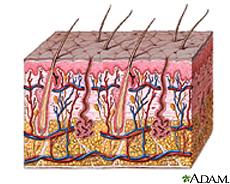 |
 |
 |
||
    |
||||
|
||||
|
Other Health Topics:
Sweat
Also called: Perspiration
Sweat is a clear, salty liquid produced by glands in your skin. Sweating is how your body cools itself. You sweat mainly under your arms and on your feet and palms. When sweat mixes with bacteria on your skin, it can cause a smell. Bathing regularly and using antiperspirants or deodorants can help control the odor. Sweating a lot is normal when it is hot or when you exercise, are anxious or have a fever. It also happens during menopause. However, if you often sweat too much, which is called hyperhidrosis, it might be due to a thyroid or nervous system disorder, low blood sugar or another health problem. Sweating too little, anhidrosis, can be life-threatening because your body can overheat. Causes of anhidrosis include dehydration, burns, and some skin and nerve disorders.
Start Here
|
| Home | Health Topics | Drugs & Supplements | Encyclopedia | Dictionary | News | Directories | Other Resources | |
| Disclaimers | Copyright | Privacy | Accessibility | Quality Guidelines U.S. National Library of Medicine, 8600 Rockville Pike, Bethesda, MD 20894 National Institutes of Health | Department of Health & Human Services |
Date last updated: 18 March 2009 Topic last reviewed: 03 December 2008 |


